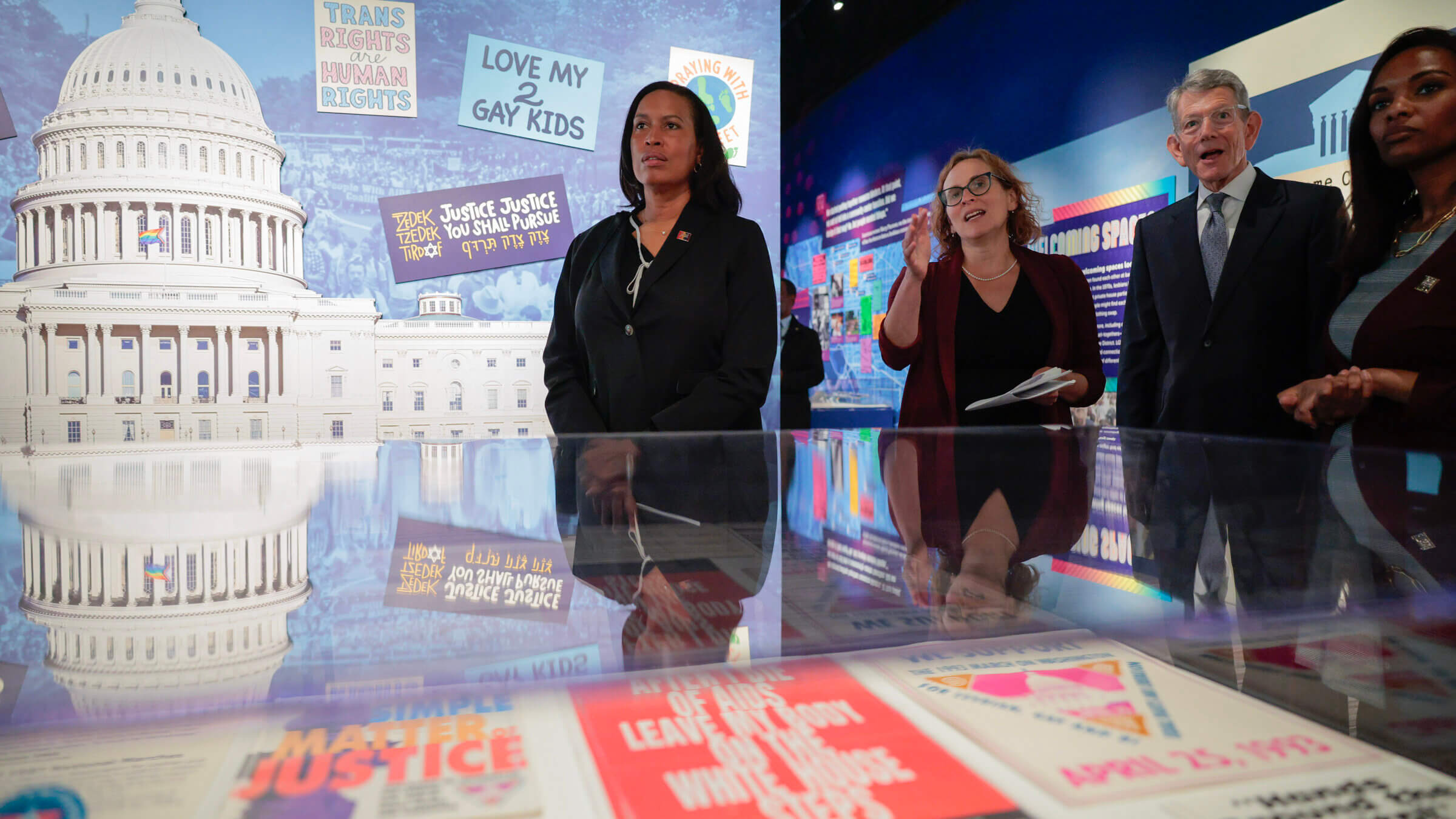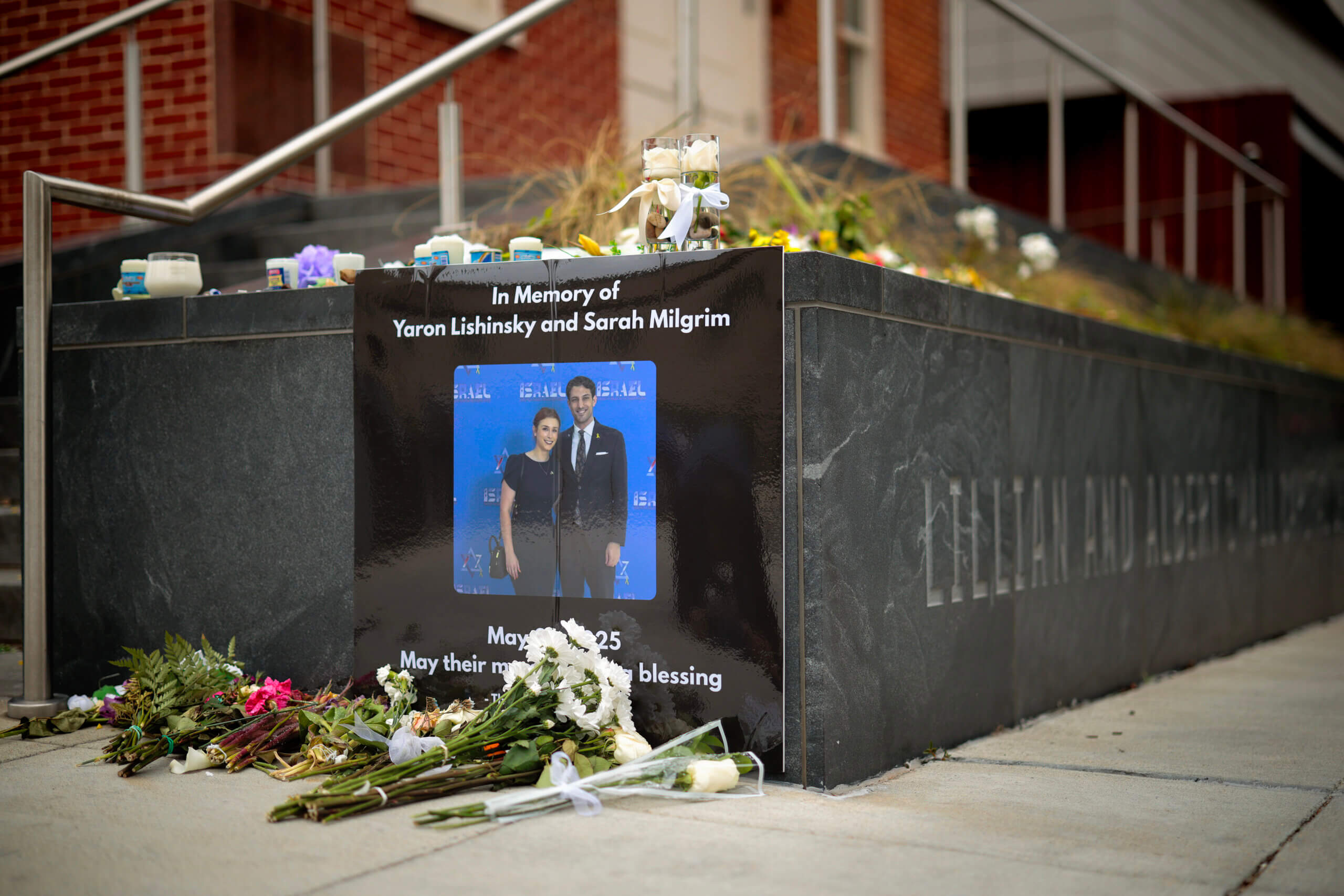‘Keep showing up’: Capital Jewish Museum reopens week after deadly shooting
The event was focused on condemning antisemitism and celebrating the museum’s work — but politics also broke through

D.C. Mayor Muriel Bowser, left, is given a tour of the Capital Jewish Museum by Executive Director Beatrice Gurwitz and President Chris Wolf following a remembrance and reopening ceremony on Thursday. Photo by Getty Images
WASHINGTON — Mayor Muriel Bowser and other top local officials spoke at the reopening of the Capital Jewish Museum in Washington, D.C., a week after a man shot and killed two Israeli diplomats as they left an event at the building.
“Part of my charge to my team in every difficult circumstance is that we have to get open, we have to get open, we have to get back to normal,” Bowser said at the Thursday morning event, which included a heavy police presence. “Thank you for getting open.”
She said her message to the city was: “Keep showing up for the Jewish community.”
Beatrice Gurwitz, the museum director, said in an interview that the museum closed for a week to “give room for a mourning period” and improve security at the building.
A 31-year-old Chicago man has been charged with murdering Sarah Milgrim and Yaron Lischinsky, who both worked for the Israeli Embassy, as they left an American Jewish Committee reception at the museum last Wednesday night. Elias Rodriguez, the suspect, allegedly told police “I did it for Gaza” after he was detained.
Rodriguez has become a cause celebre among some of the most radical critics of Israel, who have portrayed his alleged crime — apparently accompanied by a manifesto justifying it — as an act of political opposition to Israel, rather than antisemitism.
The reopening was focused on condemning antisemitism and celebrating the museum’s work, which tells the story of the local Jewish population. A number of speakers obliquely referred to the political context.
Imam Talib M. Shareef, who leads a major mosque in D.C., spoke at the event alongside Jewish and Christian clergy and decried Milgrim and Lischinsky’s murder. “Any person — no matter how desperate their situation, no matter how their hearts are pained by real or perceived wrong,” Shareef said, “there is no justification for them to murder.”
Rabbi Lauren Holtzblatt, a leader of Adas Israel, one of the most preeminent D.C.-area synagogues, described Milgrim as “committed to peace, diplomacy, building bridges and seeking to cultivate empathy.”

The most pointed remarks of the morning came from Sue Stolov, president of the American Jewish Committee’s local office, who was at the museum event on the night of the shooting.
“This is what ‘globalize the intifada’ means — it means that you or you or you could get shot and killed leaving this building right now because you are simply in a Jewish institution,” she said, pointing at the crowd, which also included Pamela Smith, the D.C. police chief.
“Globalize the intifada” has become a popular rallying cry among some pro-Palestinian activists and is often understood as a reference to two waves of violence against Israelis, though others argue it refers to political resistance and not terrorism.
Bowser said in her speech that local police were continuing to work with the FBI as they investigate the shooting, and praised interim U.S. Attorney Jeanine Pirro for her knowledge of the local Jewish community.
Milgrim was praised at the event for her work promoting LGBTQ+ rights. Bowser toured the museum’s new exhibit on LGBTQ+ Jews in Washington, D.C., with Gurwitz and Chris Wolf, the board president.
Wolf told the mayor that the show — which has been in production for more than two years, but comes as the Trump administration has issued a flurry of policies targeting sexual minorities — was opening at an opportune time.
“That is a great coincidence,” Bowser replied.

















